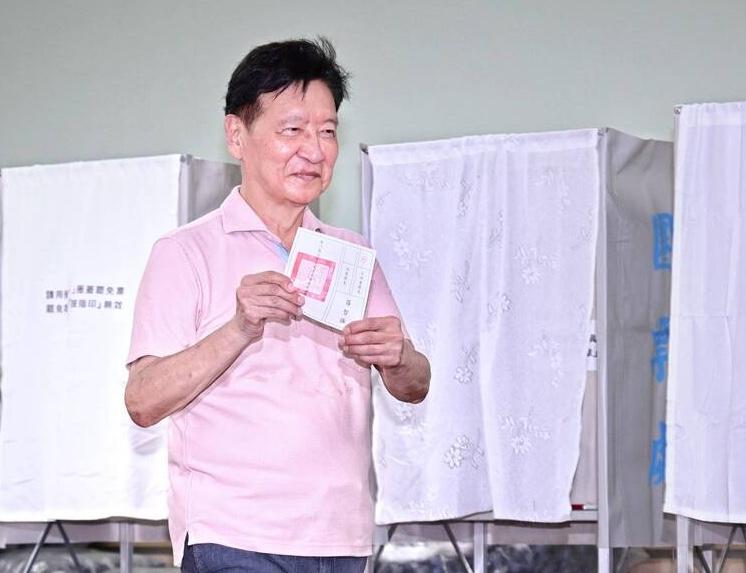Taipei prosecutors today indicted former Broadcasting Corp of China chairman Jaw Shaw-kong (趙少康) for allegedly displaying his stamped ballot to reporters during a recall vote on July 26.
The Taipei District Prosecutors’ Office charged Jaw with breaching the Civil Servants Election and Recall Act (公職人員選舉罷免法), and requested that the court impose a heavy sentence.
Under articles 88 and 105 of the act, displaying a marked ballot can result in penalties of up to two years in prison or a fine of up to NT$200,000.

Photo: Taipei Times
Jaw, as a well-known public figure who has participated in multiple election campaigns and has run as a candidate himself, should be fully aware of the regulation, prosecutors said.
He deliberately broke the law by displaying the marked content of his ballot, despite being told that he should fold it in half and knowing there were reporters outside the venue filming, they said.
After being reminded that he should not display his ballot, he again displayed the marked side for reporters to photograph and placed it into the box only after ensuring that they had finished shooting, prosecutors said.
After the incident, Jaw said he made a mistake and apologized for “setting a bad example.”
Calling Jaw’s comment an excuse, prosecutors said his claim that the action was unintentional was an attempt to minimize it.
Jaw today said that he respects the judiciary and everything should proceed according to the law.
Whether his attitude was good or not is subjective, he added.
He said that he answered all of the prosecutors’ questions in detail and expressed his hope to avoid prosecution.
He also told prosecutors that he would be extremely careful in the future and would not make the same mistake again, he said.
That he stayed to vote instead of going to Africa to watch the great animal migration clearly showed that he opposed the recall, Jaw said, adding that he did not need to show his ballot to convey his stance.
He said he would tell the court that his action was not intentional, stressing that he had no motive to commit an offense.
Additional reporting by Jake Chung

Three Taiwanese airlines have prohibited passengers from packing Bluetooth earbuds and their charger cases in checked luggage. EVA Air and Uni Air said that Bluetooth earbuds and charger cases are categorized as portable electronic devices, which should be switched off if they are placed in checked luggage based on international aviation safety regulations. They must not be in standby or sleep mode. However, as charging would continue when earbuds are placed in the charger cases, which would contravene international aviation regulations, their cases must be carried as hand luggage, they said. Tigerair Taiwan said that earbud charger cases are equipped

Foreign travelers entering Taiwan on a short layover via Taiwan Taoyuan International Airport are receiving NT$600 gift vouchers from yesterday, the Tourism Administration said, adding that it hopes the incentive would boost tourism consumption at the airport. The program, which allows travelers holding non-Taiwan passports who enter the country during a layover of up to 24 hours to claim a voucher, aims to promote attractions at the airport, the agency said in a statement on Friday. To participate, travelers must sign up on the campaign Web site, the agency said. They can then present their passport and boarding pass for their connecting international

WEATHER Typhoon forming: CWA A tropical depression is expected to form into a typhoon as early as today, the Central Weather Administration (CWA) said yesterday, adding that the storm’s path remains uncertain. Before the weekend, it would move toward the Philippines, the agency said. Some time around Monday next week, it might reach a turning point, either veering north toward waters east of Taiwan or continuing westward across the Philippines, the CWA said. Meanwhile, the eye of Typhoon Kalmaegi was 1,310km south-southeast of Oluanpi (鵝鑾鼻), Taiwan’s southernmost point, as of 2am yesterday, it said. The storm is forecast to move through central

The age requirement for commercial pilots and airline transport pilots is to be lowered by two years, to 18 and 21 years respectively, to expand the pool of pilots in accordance with international standards, the Ministry of Transportation and Communications announced today. The changes are part of amendments to articles 93, 119 and 121 of the Regulations Governing Licenses and Ratings for Airmen (航空人員檢定給證管理規則). The amendments take into account age requirements for aviation personnel certification in the Convention on International Civil Aviation and EU’s aviation safety regulations, as well as the practical needs of managing aviation personnel licensing, the ministry said. The ministry